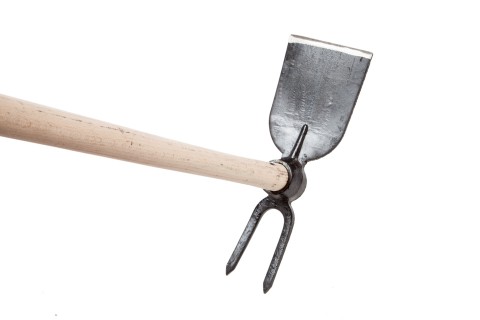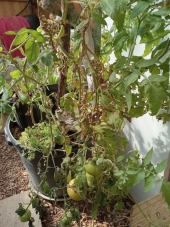





Kevin Olson wrote:
Know of anyone who's building a soddie? They need a bunch!
As a possible alternative to the sod cutter, for small plots, I've used a knock-off version of the Falci Magna Grecia hoe - a mattock on one end of the head, and fork tines on the other. To be clear, the one I have is NOT a Falci, and is much lighter duty, but I found it used at the right price - a couple of dollars. Because it's smaller, it takes smaller bites, but between the hoe blade and the three-tined fork, I can pull up sod fairly quickly.
When pulling up sod to relay (when I was fixing drainage issues around the stone foundation of my house), I used a square nosed shovel, and cut blocks that would fit on the blade of the shovel; so, first cut the edge(s) of the strip to the width of the square nose blade, either with a spade or the square nose, then sever the strip into short pieces, just the lengths of the shovel blade. Then, slip the square nose blade under the roots, parallel to the ground surface, to remove a block of sod. I slid the sods onto a tarp that I'd spread out adjacent to my excavation, trying to maintain some semblance of order for the relaying operation, but for your purposes, it could just be higgledy piggledy, I guess.
I'm sure the sod cutter would be better than either of my suggestions. There are "kick" style manual sod cutters (I think Lehman's or somebody carries them), but I've never used one of those, either. Too thrifty, I guess, so I used what I had. But, for cutting a lot of sod, the proper sod cutter is probably just the ticket.

Bonnie Kuhlman wrote:Hau Bonnie.
The removal (in your case, killing the roots) of grasses is simple but time consuming since we don't want to use chemicals.
The first method is covering the area with 2 or 3 layers of cardboard, then covering that with a thick layer (4 - 6 inches) of compost.
The second method is to use black landscape cloth, again multiple layers works best, then covering that with the thick layer of compost. In both of these methods we are smothering and blocking sunlight in order to kill the grass root system.
Both methods take a minimum of 3 months to actually do the job.
The fastest, safe method is to cut the sod (renting a sod cutting device so you're removing 2 inches of root containing soil) and removing it. Turning the cut sod green side down doesn't really work as well as you want it to work. Once the sod is removed you proceed with method 1. Once you have finished the root kill, lay on a wood chip layer of 6 inches so the removed soil is replenished by rotting wood and populated by the fungi that rot the wood chips. This will also bring in worms, springtails, beneficial nematodes etc. You will also benefit from the naturally occurring humid acids that will filtrate into the soil as the wood chips deteriorate.
Hope that helps you
Redhawk

Suzette Thib wrote:So I have clay soil and at least 6" of woods chips has done wonders. I get a bag of compost and move the wood chips to make a little hole, fill it with compost and plant into it, for herbs. For annual veggies I mix straw and wood chips at least 8-12" deep and dig the holes and fill with compost and the plants are quite happy and producing better with each passing year. As wood chips break down, we just put more on top.


